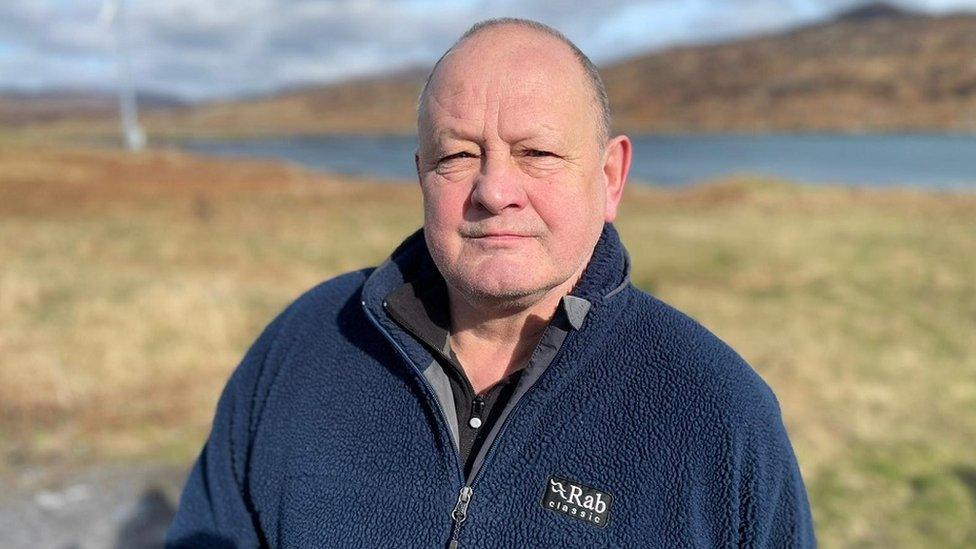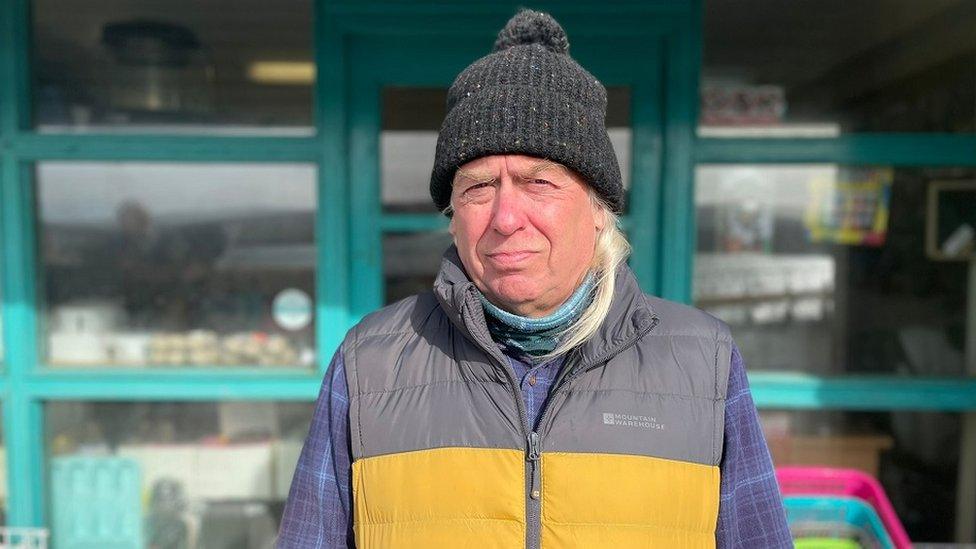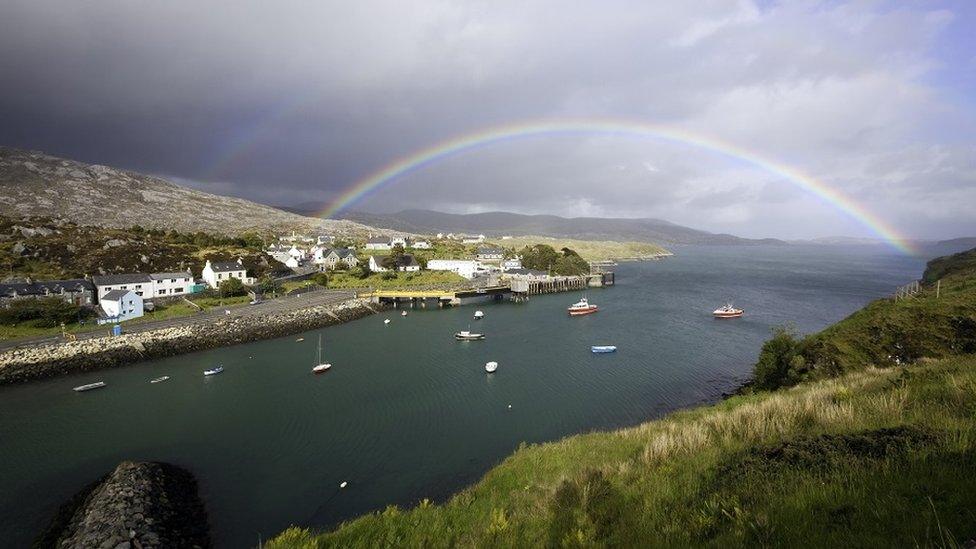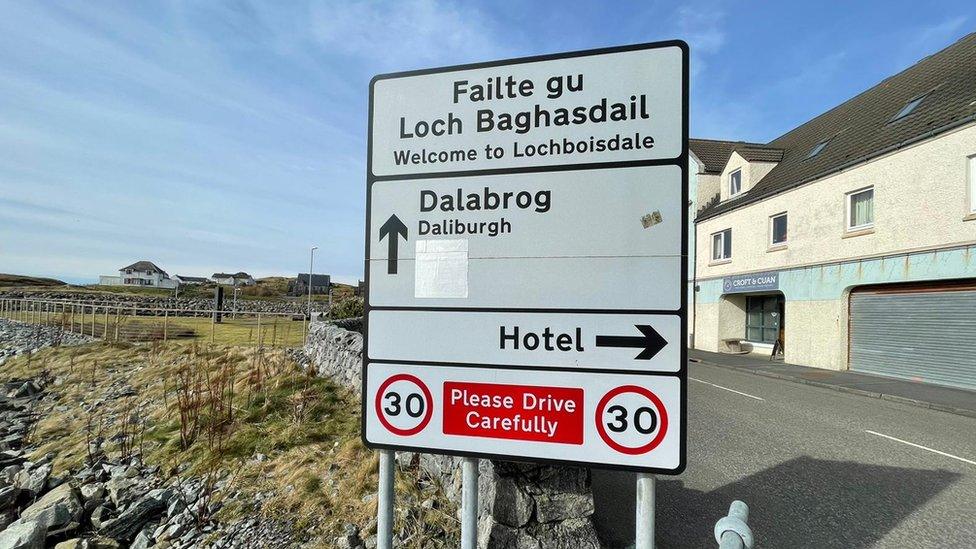How the rising cost of living is hitting islanders
- Published
Increasing fuel and energy costs making life more difficult for some islanders
People in island communities in Scotland are among those who are bearing the brunt of the cost of living crisis.
Like many in rural areas, where public transport options are limited, they are reliant on their cars and have seen fuel costs soar in recent weeks.
The price of heating their homes is also rising - most rely on electricity and heating oil and don't have access to mains gas, which is much cheaper.
It means fuel poverty levels in the Western Isles and Highland council areas are the worst in Scotland, according to Energy Action Scotland.
And with gas and electricity bills due to rise in April, and fears of further increases in October, the charity says more households look set to fall into fuel poverty next month.
In South Uist in the Western Isles, residents are well used to spending a little bit more than their mainland neighbours on everyday essentials.
But in recent weeks the price of petrol has risen to £1.80 a litre and over the last few years the cost of filling a tank of heating oil has more than doubled.
Food and other essentials have also increased in price, and there is little option to shop around.

Hotelier Callum Macaulay has seen cost rises for his businesses
Hotelier Calum Macaulay said he was considering closing his business, the Lochboisdale Hotel, in the winter to keep costs down.
"We are totally reliant on the oil tank. But the cost to fill this tank now has doubled," he said.
"At the usage rate of approximately 500 litres per month it is costing us over £500 just to keep the hot water running in the hotel.
"We have seriously got to look at the Lochboisdale as purely a seasonal operation."

Stewart Curtis said islanders do not have the option to shop cheaply
Islander Stewart Curtis said people on South Uist have a limited range of goods to pick from when they are doing their food shopping.
"On the islands we don't have the option to shop cheaply," he said.
And another island resident, Neil Campbell, who delivers medical supplies and needs his van for work, said in the last two weeks petrol and diesel costs had gone up by about 20p a week.
He said: "The cost of living is extortionate. In the shops there is a very poor selection of products but you're paying through the nose for it.
"Here on the islands we pay more for fuel at the best of times. It is something we just have to live with."
He added: "You just have to become more careful with whatever journeys you have to do. I don't jump in the van and drive as much as I used to do."


People on the Western Isles are no strangers to higher costs at the best of times.
But, according to the islanders I met in Lochboisdale, soaring prices are creating additional significant pressure like never before.
Scotland's rural communities disproportionately rely on electricity and oil to heat their homes. It is rare to see a property using mains gas, which is much cheaper.
This makes it hugely difficult for consumers in these areas to pick dual fuel tariffs from suppliers, which would usually come with discounts.
The cost of heating oil has gradually increased. There is no price-cap unlike gas and electricity. The prices customers tend to pay are typically whatever the cost is on the day the tank is being filled up. There is usually no contract involved.
On the mainland, a typical rural consumer usually has the option to choose from 4 heating oil suppliers within a 25 mile radius. On the islands this can be much harder and the lack of choice means most locals have no option but to pay through the nose.
The financial squeeze for many is scary.

About 57% of households in the Western Isles and 47% in the Highlands will soon fall into fuel poverty, according to modelling by Energy Action Scotland.
That means they will spend more than 10% of their income on energy, after housing costs have been deducted.
The charity's chief executive, Frazer Scott, said an average of about 38% of households across the country will no longer be able to heat their home adequately.

Comhairle nan Eilean Siar has called for measures to help islanders and other parts of Scotland
Western Isles council, Comhairle nan Eilean Siar, has written to energy regulator Ofgem suggesting policy solutions to protect vulnerable communities against electricity price rises.
The comhairle said there should be a move away from a one-size-fits-all approach to the energy price cap - the maximum price suppliers can charge household.
They say it should be possible to identify areas with the high fuel poverty and to reduce the cap accordingly.
It has also called for a removal of electricity distribution charges for customers in the north of Scotland to help ease costs.
Ofgem said that while it did cost more to transport electricity longer distances to areas with fewer consumers, this was recognised by a scheme that meant people in other parts paid a little more to bring down charges to consumers in north Scotland.

Lochboisdale struggles with ferry access and fuel costs making life more difficult
The Scottish government said it was acutely aware households across Scotland - and right across the UK - were facing "a hugely challenging increase in energy bills".
A spokesman said: "Powers relating to the energy markets remain reserved and Scottish ministers have repeatedly called for the UK government to urgently take further, tangible actions to support households - including a reduction in VAT, targeted support for those on low incomes and four-nations discussions to develop an effective response to the energy bill increases.
"We would urge those worried about or struggling to heat their homes to seek advice and support. Our free and impartial Home Energy Scotland service stands ready to offer this service."
The UK government said it was providing support worth £21bn this financial year and next to ease pressures and help working families, low-income households and the most vulnerable.
A spokesman said: "There is also targeted support for consumers in the north of Scotland, to reduce electricity distribution charges there, of an annual assistance amount of £90m delivered through the UK government's Hydro Benefit Replacement Scheme."
